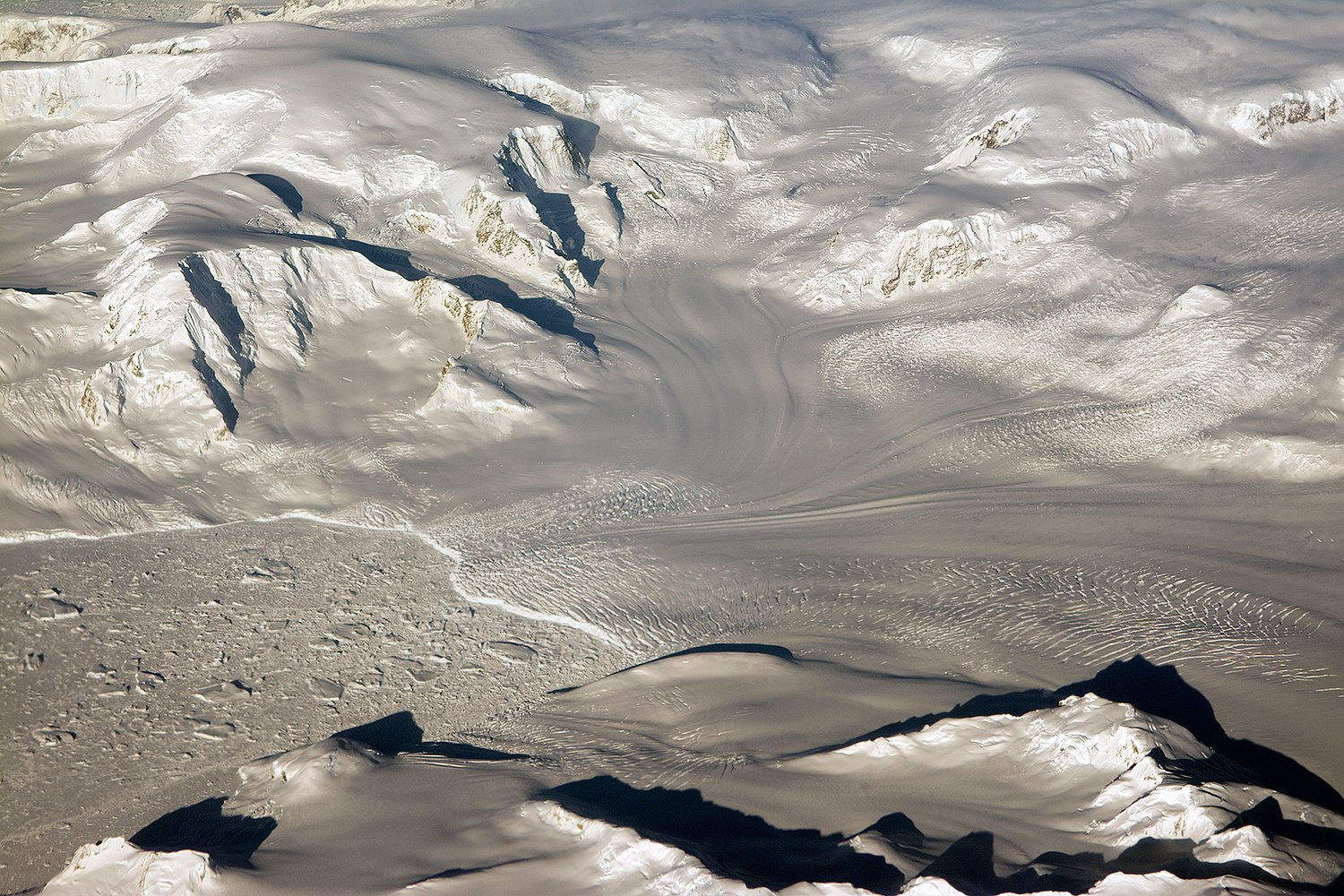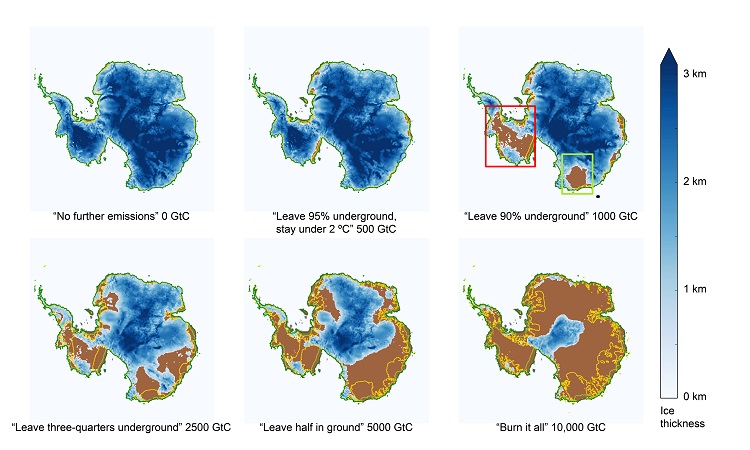Unrestrained Fossil Fuel Burning Could Drown World's Major Cities

Burning all of Earth's fossil fuels would trigger enough global warming to completely melt the Antarctic ice sheet, a new study finds.
If this ice were to melt, it would cause sea levels to rise by 200 feet (60 meters), drowning land around the world that is currently home to more than a billion people, the researchers said in the study.
"If we burn it all, eventually New York City and Washington, D.C., and Miami and London and Rome and Tokyo and all the other cities on the coast will get lost," study co-author Ken Caldeira, an atmospheric scientist at the Carnegie Institution for Science at Stanford University in California, told Live Science.
Carbon dioxide is a greenhouse gas that traps heat from the sun in the atmosphere. Burning fossil fuels such as coal and oil releases carbon dioxide, which drives up overall temperatures on Earth. This global warming melts ice sheets and, in turn, raises sea levels worldwide.
Most Antarctic ice is stable right now, meaning it is not melting faster than ice is accumulating, on average. Antarctic melting is responsible for less than 10 percent of the current rise in global sea levels, with the rest currently coming from melting in areas such as Greenland, Caldeira and his colleagues said. [See Stunning Photos of Antarctic Ice]
Still, Antarctica has already begun to lose some ice, with recent studies suggesting that ice melt in West Antarctica, which holds 10 percent of the continent's ice, may be unstoppable. And the way in which the frozen continent evolves in response to current and future fossil fuel combustion will have consequences on coasts worldwide.
A complex array of factors will determine the rate at which Antarctic ice will melt, including the manner in which the atmosphere and oceans warm and the possible counteracting effects of snowfall, which reflect the sun's heat back into the atmosphere. As an analogy, "it is much easier to predict that an ice cube in a warming room is going to melt eventually than it is to say precisely how quickly it will vanish," study lead author Ricarda Winkelmann, a physicist and mathematician at the Potsdam Institute for Climate Impact Research in Germany, said in a statement.
Sign up for the Live Science daily newsletter now
Get the world’s most fascinating discoveries delivered straight to your inbox.
To see what might happen to Antarctica, the scientists modeled how Antarctic ice might respond to a wide range of future carbon dioxide emissions scenarios over the next 10,000 years, because the greenhouse gas persists in the atmosphere millennia after it is released. Previous simulations, by contrast, had mainly looked at changes Antarctica might experience on shorter timescales.

"Back in the 1980s, it was thought that carbon dioxide emissions didn't hang around for very long, and that ice took a long time to melt," Caldeira said. "There's been a change in perception in both regards."
"What we do today, within just a few decades, is triggering changes, such as the ice loss from Antarctica and the resulting global sea level rise, that go on for thousands of years," Winkelmann told Live Science.
The researchers found that the West Antarctic ice sheet will become unstable — that is, it will lose ice at an increasing rate over time — if carbon dioxide emissions continue at their current levels for the next 60 to 80 years. Such fossil fuel combustion would release only about 6 to 8 percent of the 10 trillion tons of carbon that could be released if all accessible fossil fuels on the planet were burned. [Images of Melt: Earth's Vanishing Ice]
In what might be the best-case scenario, if global warming does not exceed the 3.6-degree Fahrenheit (2 degrees Celsius) increase benchmark often cited by climate policymakers, the sea level rise over the next 1,000 years might be restricted to about 6.5 feet (2 m). However, such limited global warming still runs the risk of destabilizing the West Antarctic ice sheet, and this risk increases with every additional tenth of a degree Celsius (0.18 F) of warming, Caldeira said.
"The West Antarctic ice sheet may already have tipped into a state of unstoppable ice loss," study co-author Anders Levermann, also of the Potsdam Institute, said in a statement.
However, exceeding this benchmark could make the much larger East Antarctic ice sheet unstable as well, researchers said.
In the worst-case scenario, if all the fossil fuel in the world were to be burned, "half the Antarctic ice sheet would be melted in 1,000 years, and the rest would melt within 10,000 years," Caldeira said. This melting includes not only the West Antarctic ice sheet, but also the East Antarctic ice sheet — "by far the biggest block of ice on this planet," Caldeira said.
"In this 'burn it all, melt it all' scenario, the average rate of sea level rise in the next 1,000 years exceeds an inch (2.5 centimeters) a year," Caldeira said. "That's about a foot (30 cm) per decade, or 10 feet (3 m) a century, for 100 feet (30 m) by the end of 1,000 years and 200 feet by the end of 10,000 years."
"When it comes to protecting coasts, no one is going to build a seawall 100 feet high," Caldeira added. "It is one thing to say, 'We can deal with 2 or 3 feet [60 to 90 cm] of sea level rise.' It is another thing entirely to discuss when we will be forced to abandon New York, London, Paris, Rome, Washington."
Although such levels of global warming would also melt Arctic ice, "if we ultimately see 200 feet of sea level rise, the vast majority of that will come from Antarctica," Caldeira said. "Maybe 20 feet of that will come from the Arctic."
Future research can investigate how robust these findings are. This analysis may actually turn out to be conservative, Caldeira said.
"Our study drives home the point that climate change is not a little thing that we will adapt to without even noticing," Caldeira said. "Unrestrained fossil fuel burning means giving up many, if not most, of the major cities of the world. It means giving up Florida. Hopefully, our study will help people realize that there is great benefit to rapidly transforming our energy system into one that does not rely on using the sky as a waste dump."
"We have to decide if, by emitting greenhouse gases, we want to change the face of our planet as we know it and yield impacts that will affect many, many generations to come," Winkelmann said.
The scientists detailed their findings online today (Sept. 11) in the journal Science Advances.
Follow us @livescience, Facebook & Google+. Original article on Live Science.











